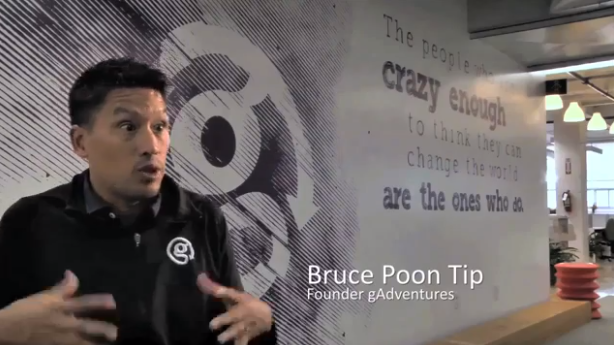
by admin | Oct 18, 2013 | Communication development/evaluation, Communication strategy, Innovation, Market dynamics
Mashable‘s Events Board is a great place to find the leading conferences in your industry — whether it’s advertising, technology, media or public relations. This week, we’re highlighting five events that we think can help move your career forward. Our picks include events in New York, San Diego and the Bay Area. If you don’t find something that’s right for you, check out more than 70 events featured on our complete listings. Read...

by admin | Oct 16, 2013 | Brand strategy, Market dynamics
Bruce Poon Tip embodies Peter Drucker’s adage: “Culture eats strategy for breakfast.” As the founder of the Toronto-based travel company, G Adventures, Poon Tip has created a culture that has enabled him to take on larger competitors and win. Earlier this year, Bruce hired my firm to help him accelerate sales. G Adventures was already a successful brand, they’d been named by National Geographic Adventures as the best ‘Do It All Outfitter’ on Earth, they consistently win workplace awards, and Bruce had been an E & Y Entrepreneur of the year twice. Our challenge was to scale their success, and establish a consistent approach to sales around the globe. Read...

by admin | Oct 14, 2013 | Innovation, Market dynamics
Yale University professor Robert Shiller was one of three people to win the 2013 Sveriges Riksbank Prize in Economic Sciences (also known as the Nobel Prize in Economics). Shiller is already a god among economists. He famously predicted two of the biggest bubbles of all time: the dot-com bubble and the housing bubble. Both times, he published an edition of his book Irrational Exuberance, which described and predicted each respective bubble. Read...

by admin | Oct 14, 2013 | Brand identity, Market dynamics
While some newspaper companies have spent recent years shifting their emphasis to other types of investments like television, The New York Times has taken a different path. It has been selling off its peripheral assets and concentrating on its flagship newspaper and website. Regional newspapers: gone. Its stakes in the Boston Red Sox and the New England Sports Network: gone. About. com: history. The Boston Globe: sold at a steep loss. Read...

by Ignite Lab | Sep 25, 2013 | Market dynamics
Perhaps no one has done more for the cause of data-driven decision-making in the minds of the public than Nate Silver. His book, The Signal and the Noise, explains the power of statistical modeling to improve our predictions about everything from the weather to sports to the stock market. Data science is the hottest field to be in right now, and Silver is its poster child. But for most people, the gulf between recognizing the importance of data and actually beginning to analyze it is massive. How do those without extensive training in statistics equip themselves with the skills necessary to thrive (or even just survive) in our age of “big data”? Read...
by Shari Allison | May 7, 2013 | Market dynamics
Every day, we make a thousand little compromises, avoid opportunities, actions and people–all so that we can stay away from the emotion of fear. Note that I didn’t say, “so we can stay away from what we fear.” No, that’s something else entirely. Right now, most of us are avoiding the things that might merely trigger the emotion itself. That’s how distasteful it is to us. The alternative? To dance with it. To seek out the interactions that will trigger the resistance and might make us uncomfortable. Are we trying to avoid the unsafe? Or merely the feeling of being unsafe? Increasingly, these are completely different things. Due to ‘enhanced security’ a recent bike event in New York City forbade the 30,000 riders from carrying hydration packs. No practical reason, just the desire to avoid fear. The upcoming exam doesn’t get studied for, not because studying is risky, but because studying reminds us that there’s a test coming up. We loudly keep track of all the failures of commission around us, but never mention the countless failures of omission, all the mistakes that were made by not being bold. To track those, to remind ourselves of the projects not launched or the investments not made is to encounter our fear of forward motion. (So much easier to count typos than it is to mention the paragraphs never written.) There’s no other reason for not having a will, a health proxy, an insurance policy or an up to date checkup. Apparently, while it’s not risky to plan for our demise, it generates fear, which we associate with risk, and so we avoid...






